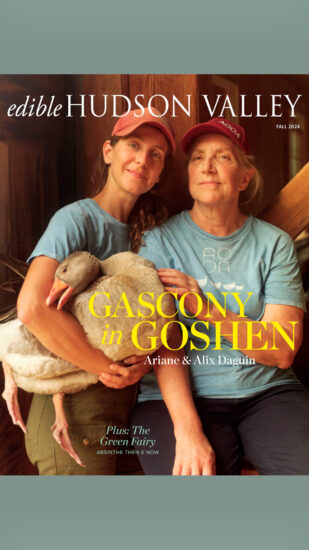WHO: Kristopher Schram
DINER: West Taghkanic Diner, Ancram
FIRST RESTAURANT JOB: Pizza Garden, Hudson
CAREER: Bæst (Copenhagen), Relæ (Copenhagen), Terra (Napa Valley)

Roadside. Populist. Built for speed. The American diner was a thing of beauty.
I say was because, tragically, the Great Age of the American Diner is over. With the advent of even cheaper and faster food, individually owned diners lost their roadside spots to invading armies of McDonald’s and Mobil Marts. But worse than the real estate, many American diners also lost their souls. Unable to compete in price, they ditched house-made fare—eggs, burgers, blue plate specials—for mile-long menus of factory-spawned frozen foods.
But here’s the thing: Having historically offered hospitality to the working people who were unwelcome at other restaurants, diners carved a lasting niche in the American heart. Consider all the TV shows and movies where diners play a central role: “Seinfeld,” Reservoir Dogs, Goodfellas. When directors want a universally recognized American meeting place, they film in a diner.
Here in our region, two elite chefs have opened diners—one north and one south. We caught up with them and asked, What is it about diners?



When you think of Hudson’s architecture, it’s easy to privilege the 19th century: all that age and ornament, all those fancy roofs. But in Ancram, there’s a building that speaks equally eloquently of its time. It’s the West Taghkanic Diner, straight outta 1953, a beacon of stainless steel.
Its new owner, Chef Kristopher Schram, knows from restaurant bling. Beyond his extensive fine-dining experience (in which no technology was denied), he also comes from Bæst, Christian Puglisi’s wood-fired pizzeria in Copenhagen. Bæst is notoriously unhinged. First, it cured its own salumi. Then it made its own cheese. Then it bought its own cows.
Nowadays, Schram and two other chefs battle it out in a miniscule kitchen that was designed for frying burgers. His solitary blingy tool is the nine-foot smoker outside where Schram and his team smoke bacon, pastrami, clams, pork belly, turkey breast—even water, which Schram uses like dashi to add a subtle umami richness to many foods, even hollandaise.
“I see a diner in a different way,” he says. “Yes, there is short order cooking, there are eggs for breakfast. And I love eating at diners. But what I’ve planned here is that you have your staples—your Reubens, your breakfast plates, your turkey clubs—but everything else can be kinda different. And when you look at diner menus—Greek diners, Mexican diners—there really are no rules.”

WTD’s breakfasts nod to modern appetites. “Local Greens and Grains” offers eggs over smoked chickpeas with Nordic rye bread. There’s local yogurt with chia seeds and local grain porridge; but also, Schram is literally slinging hash—a plate of eggs, pastrami, bacon, potatoes, and toast.
Meanwhile, Schram is lovingly restoring WTD’s wealth of vintage, diner-specific equipment. This includes steely waiter stations with reach-in flatware troughs, gravity-fed plate and saucer dispensers, and virtually everything behind the counter. The only thing missing is the Bunn-O-Matic coffee machine.
“We were going with much better quality, but I didn’t want to lose that touch. We’re putting our really good coffee in insulated pitchers and pouring free re-fills at the table.”


Eugene’s Diner and Bar
WHO: David DiBari
DINER: Eugene’s Diner and Bar, Port Chester
FIRST RESTAURANT JOB: Paradise, Verplanck
CAREER: Babbo (NYC), Danube (NYC), Patroon (NYC)

A smile creeps across Chef David DiBari’s face when he talks about the diners of his youth in Verplanck—and this is having worked at Babbo under Batali and Bastianich, and at Danube under David Bouley. “A diner is what everyone wants at the end of the day. It really is. And they’ve bastardized them nowadays with all that frozen shit.”
At his Port Chester diner, Eugene’s Diner and Bar, the maple sausage links, bacon, pastrami, Spam, and baloney are all made in house, while a rotisserie spins turkey legs and whole chickens. The baloney will be piled into sandwiches with pickles and cheese sauce, while the turkey is layered with gravy and peas for the Hot Flamingo, an open-faced sandwich. There are eggs, lots of them, in all-day breakfasts—but the toast is made with fine-crumbed Japanese milk bread and the yolks are sous-vided until they reach the elastic gooeyness of cello-wrapped cubes of caramel. You can, and should, order this dish topped with caviar.


For a chef who operates two Italian restaurants—The Parlor and The Cookery—his diner represents total freedom. “A diner menu is like a vessel for all the things that shouldn’t go together. I mean, all-day breakfasts—dinner with maple syrup!”
“But, as important as the food is, a diner is more about community. All walks of life, whoever they may be and for whatever reason, end up at the diner together.” Here, DiBari laughs.
“There’s joke: A dude sits next to a cop at the diner. He looks at the cop and says, ‘Hey, didn’t you arrest me last month?’ The cop, drinking his coffee, looks over at him and says, “OK … but can you pass the ketchup?’ That’s what makes a diner.”
Kristopher Schram | @kris_schram
West Taghkanic Diner | @wtdiner
Bæst | @baestcph
Relæ | @restrelae
Terra
David DiBari | @chefdibari
Eugene’s Diner and Bar | @eugenesdiner
Babbo | @babboristorante
Danube | @bluedanubenyc
Patroon | @aretskyspatroon
David Bouley | @davidbouley
The Parlor | @theparlordf
The Cookery | @thecookery

This story was originally published in August of 2019.



